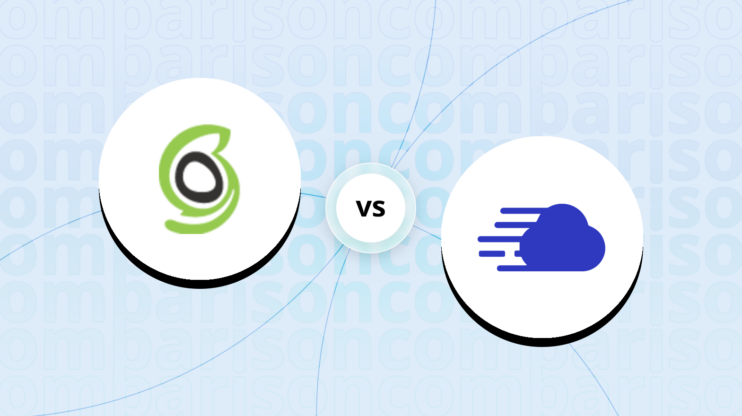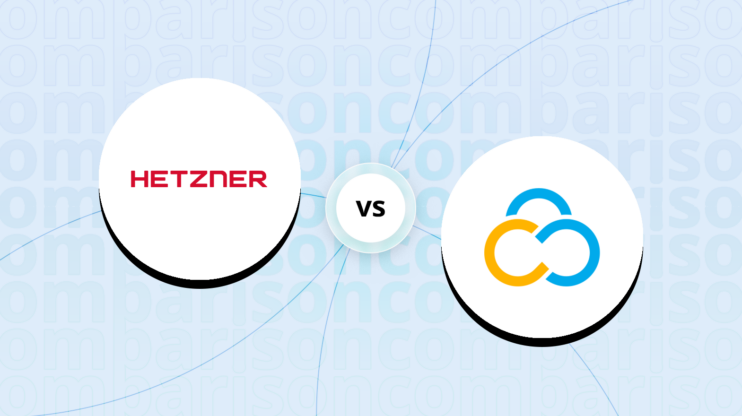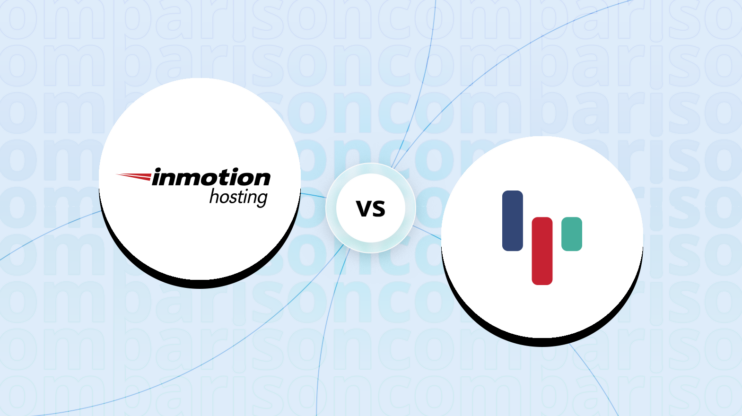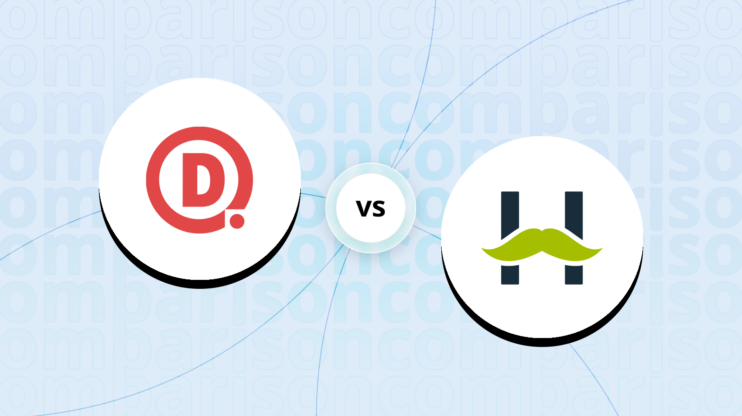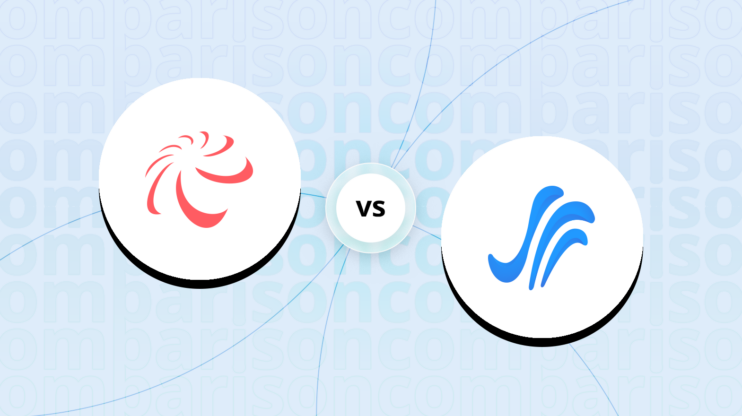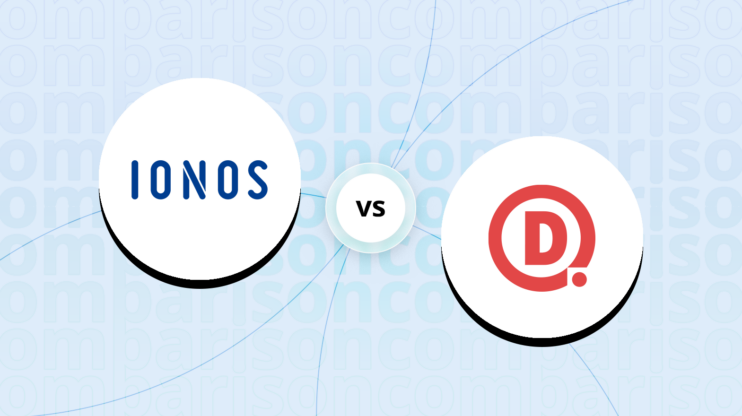Siteground vs Digital Ocean: Final verdict
Looking over SiteGround vs. DigitalOcean, it’s clear why both hosts are so popular. They have both hosted millions of
websites that run on WordPress for decades, building up a loyal customer base.
-
DigitalOcean (Overall grade: 8.3)
is well-suited for developers and businesses needing scalable and flexible hosting solutions. Its competitive pricing, multiple data centers, and robust security features, like managed databases and Kubernetes options, cater to high-traffic websites. Despite lacking a built-in website builder and offering limited customer support channels, DigitalOcean’s clear documentation and community resources help mitigate these issues. The platform excels in providing raw infrastructure that can be tailored to meet specific needs, making it a cost-effective choice for technically adept users and startups.
SiteGround (Overall grade: 8.8)
offers a versatile hosting solution ideal for WordPress and eCommerce sites. Users appreciate its consistent uptime, rapid response times, and wide-ranging support channels like live chat and phone. The built-in speed optimizations, along with daily backups and free SSL certificates, make it user-friendly, especially for non-technical customers. However, the higher renewal prices may be a drawback for budget-conscious users. The inclusion of a website builder and email hosting without additional costs bolster its appeal to beginners and small businesses.
 Overall grade:8.8 |
 Overall grade:8.3 |
|
|---|---|---|
| Uptime and Availability | 9.4 | 9.2 |
| Hosting Performance | 8.8 | 8.8 |
| Hosting Security | 8.6 | 9.1 |
| Price | 8.4 | 8.7 |
| Hosting Features | 8.5 | 6.9 |
| Ease Of Setup | 8.9 | 8.2 |
| User Management | 8.4 | 8.0 |
| Customer Support | 9.2 | 7.8 |
| User feedback | 4.3/5 | 4.6/5 |
Hosting types offered
Both platforms provide a variety of hosting types, each designed to meet the different needs of users.
 |
 |
|
|---|---|---|
| Shared hosting | ||
| Cloud hosting | ||
| WordPress hosting | ||
| Ecommerce hosting | ||
| VPS hosting | ||
| Dedicated hosting |
Although both offer a variety of hosting plans tailored to different needs, in certain cases, one platform may prove to be more suitable.
Detailed comparison
Uptime and availability
Evaluates the average uptime statistics, uptime guarantee and overall availability of the hosting
provider
Score Components:
- Uptime percentage (30%): evaluates the uptime statistics in given period of time
- Uptime guarantee (20%): Assesses if the platform offers an uptime guarantee and
whether the actual uptime matches the promised guarantee. - General performance (25%): Evaluates how fast is the average response time and overall
it’s stability. - Responsiveness (10%): Adaptability to different devices and screen sizes.
- Availability (25%): Reflects the total downtime and number of outages.
 9.4
9.4
 9.2
9.2
🏆 Winner
SiteGround: Offers exceptional uptime, fast response times, and stellar customer support.
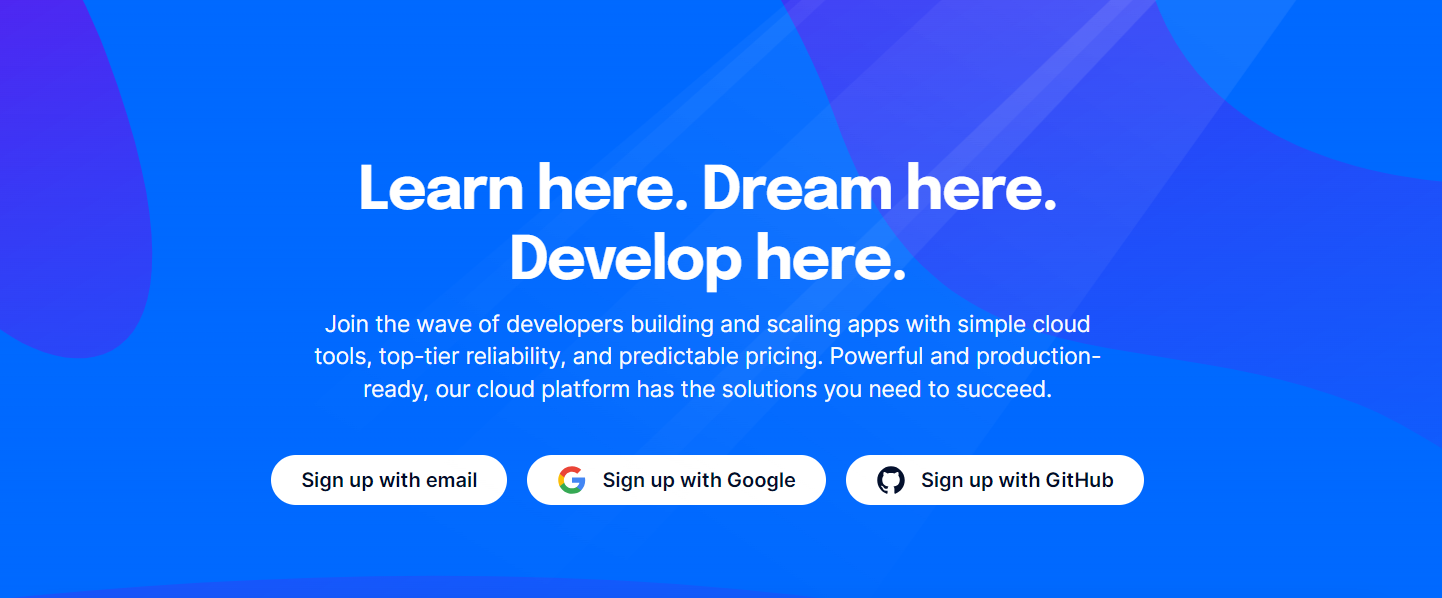
SiteGround provides a 99.9% uptime guarantee, translating to minimal downtime per month. Over two months, it achieved a near-perfect 99.99% uptime with only 7 minutes of total downtime. SiteGround’s response time averaged 0.207 seconds, making it the quickest among recent tests. It ensures consistent and reliable performance, with its highly responsive customer service available 24/7 via live chat, phone, and ticket system.
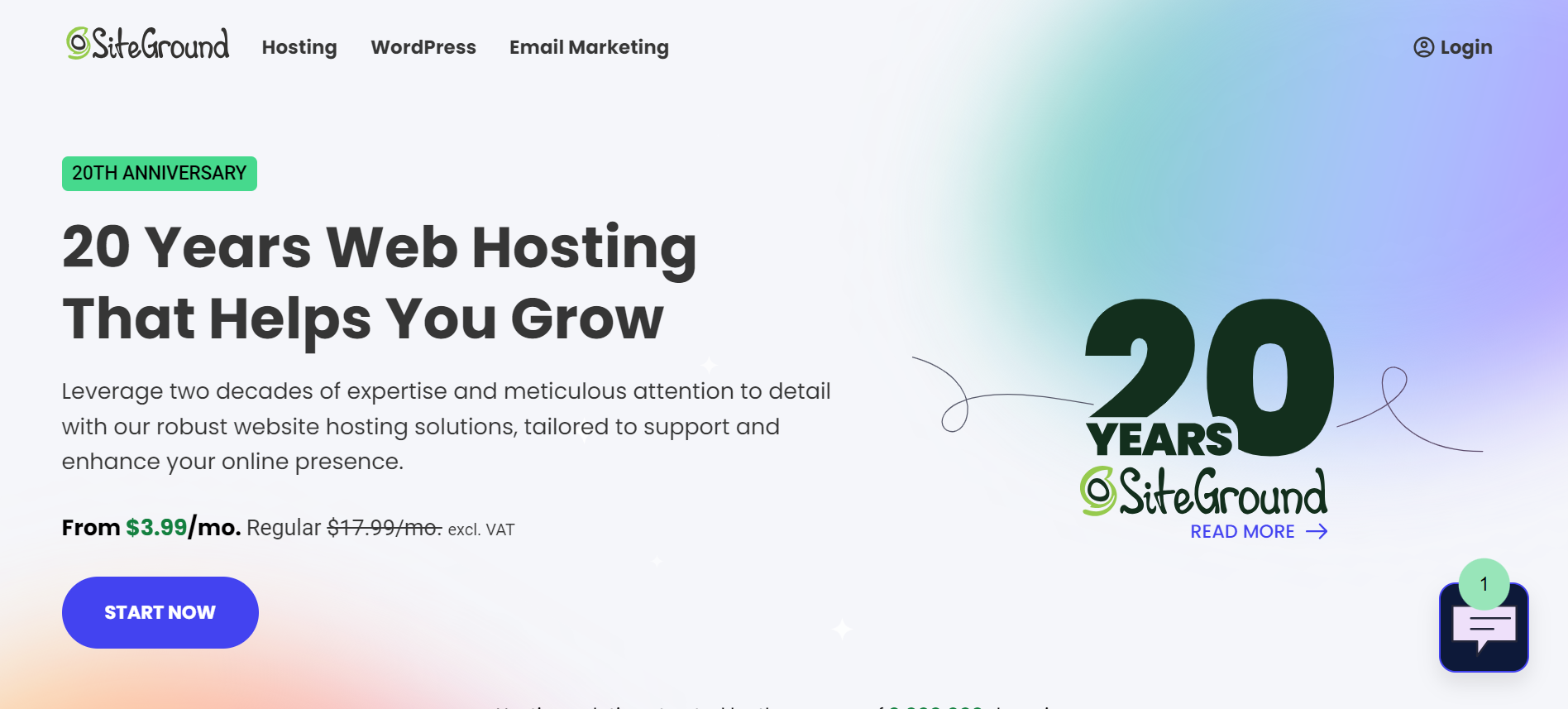
DigitalOcean guarantees a 99.99% uptime with real-time monitoring and latency alerts. It operates multiple data centers and uses high-quality infrastructure to minimize downtime and ensure consistent performance. Despite these advantages, DigitalOcean’s customer support is limited to a ticketing system and community resources. Although both providers are strong contenders, SiteGround’s faster response times and comprehensive support give it the edge.
Which one has better hosting performance?
Score Components:
- Hosting speed (30%): This includes SSD quality, Load times, PageSpeed score ranges,
additional information on website speed, built-in plugins for performance enhancement, available caching
methods, and CPU/RAM options - CDN (20%): Considers whether CDN is available or not, whether it’s free or paid, and
the quality of the CDN service - Available data centers (30%): Evaluates the number of data centers and their locations
globally. - Scalibility (20%): Looks at whether elastic scaling is available, the process required
to scale (manual upgrade vs. automatic scaling), the presence of dedicated servers, and the costs
associated with scaling.
 8.8
8.8
 8.8
8.8
🏆 Winner SiteGround: Reliable hosting with cutting-edge speed technologies.
Both SiteGround and DigitalOcean offer high-quality hosting services. SiteGround excels in speed due to its premium Google Cloud infrastructure, fast SSDs, and a variety of caching options like NGINX Direct Delivery and SuperCacher. In contrast, DigitalOcean utilizes Droplets with flexible SSD storage and efficient caching mechanisms. SiteGround includes a free CDN service, whereas DigitalOcean offers a CDN but doesn’t specify if it’s complimentary. SiteGround boasts multiple data centers in top locations with over 170 CDN edge locations as part of Google Cloud, while DigitalOcean features 14 globally distributed data centers.
Website Speed
SiteGround shines in website speed with custom PHP and MySQL setups that cut the TTFB and load pages 30% faster on average. It’s equipped with static and dynamic caching for WordPress, enabling sites to be up to 5x faster. The hosting environment is optimized with technologies like Brotli, HTTP/2, TLS 1.3, and OCSP Stapling. DigitalOcean’s performance focuses on SSD storage and caching mechanisms, which also ensure quick content retrieval and database operations. However, it lacks the built-in speed optimization plugins that SiteGround offers.
Scalability
Both providers offer scalable solutions but differ in approach. SiteGround requires users to upgrade plans for more resources, like moving from StartUp to GrowBig or GoGeek. They do not mention dedicated servers, so details are unclear. DigitalOcean allows more flexible scaling with its Droplets, enabling horizontal scaling to distribute traffic during peak periods. Pricing for scaling starts from $4 per month, but exact costs for extensive scaling aren’t specified. DigitalOcean’s approach might be more cost-effective as it allows incremental adjustments rather than jumping to the next hosting tier.
Which one has better security features?
and regulatory requirements
Score Components:
- Technical security measures (40%): This includes encryption, firewalls, DDoS
protection, secure configurations, server monitoring, access control and availability of security addons
(e.g Sitelock security). - Operational security measures (30%): Encompasses data privacy, backups and data
redundancy. - Compliance and certifications (20%): Adherence to legal and regulatory requirements
(e.g., GDPR, HIPAA) and possession of certifications (e.g., ISO 27001, SOC 2). - Business and reliability (10%): Factors in the provider’s reputation, uptime
guarantees, and customer support.
 8.6
8.6
 9.1
9.1
🏆 Winner DigitalOcean: A host packed with comprehensive security features and robust compliance certifications.
Both SiteGround and DigitalOcean, have notable differences in their approaches to technical and operational security, as well as in their compliance with regulations.
Technical security measures:
Both SiteGround and DigitalOcean offer a wide array of technical security measures to protect hosted sites. SiteGround employs a 24/7 system administration, smart web application firewall (WAF), and a unique AI anti-bot system. It also provides free SSL certificates and automatic updates for WordPress and WooCommerce. On the other hand, DigitalOcean provides SSL certificates, DDoS protection, SSH access, and automatic backups. DigitalOcean distinguishes itself with additional features like data encryption both at rest and in transit, as well as a virtual private cloud (VPC) for secure networking.
Operational security measures:
SiteGround’s operational security measures are robust, including multi-layered security managed by Google Cloud, custom security solutions, and distributed backups. They also provide daily backups with easy restoration options. DigitalOcean offers cloud firewalls, managed databases with encrypted connections, and load balancers to distribute traffic. Two-factor authentication is available to secure user accounts, along with a web application firewall to block harmful traffic. DigitalOcean’s inclusion of managed object storage also highlights its comprehensive approach to data integrity.
Compliance and certifications:
SiteGround does not claim GDPR or HIPAA compliance but secures data centers managed by Google Cloud with several security layers. It lacks PCI-compliant servers for any hosting plan. DigitalOcean excels in compliance, meeting GDPR, PCI, and a vast array of other certifications including SOC 2 Type II, SOC 3 Type II, ISO/IEC 27001:2013, CSA STAR Level 1, and APEC CBPR PRP. This variety positions DigitalOcean well above SiteGround in regulatory adherence.
 |
 |
|
|---|---|---|
SSL certificate |
Yes |
Yes |
Additional security features |
Yes |
Yes |
PHP versions |
Not specified |
Yes |
GDPR compliance |
Not specified |
Yes |
HIPAA compliance |
Not specified |
Not specified |
PCI compliance |
No |
Yes |
Hosting features
Score Components:
- Domains (20%): Assesses the availability of a free domain, domain purchase options, and
pricing - Email (15%): Considers if the provider offers full email hosting, or is reselling
third-party service, and if the email is only transactional or not - Website builder (15%): Checks if website builder is available, and it’s user
friendliness and overall the level of customization allowed. - Staging environment (20%): Determines if a staging environment is available, allowing
for testing changes before going live. - FTP & SFTP accounts (10%): Evaluates if and how easily users can access FTP and
SFTP accounts - Git and SSH access (20%): Assess whether Git is integrated into the hosting service and
if SSH access is provided
 8.5
8.5
 6.9
6.9
🏆 Winner
SiteGround: A comprehensive hosting solution tailored for WordPress and eCommerce websites.
When comparing SiteGround and DigitalOcean, the availability of features like a website builder, ease of use, and the ability to cater to complex customization needs are key factors to consider. SiteGround offers a free site builder, making it user-friendly, especially for beginners who may not be comfortable with coding. In addition, it provides an array of free services, including SSL certificates, daily backups, and email hosting, all aimed at enhancing user experience with no additional costs. Their managed WordPress hosting, combined with features like WP-CLI, staging, caching, and priority support, make it a robust choice for WordPress enthusiasts.
On the other hand, DigitalOcean lacks a dedicated website builder, which might pose a challenge for those who prefer a more straightforward setup process. However, it offers a variety of hosting types, including VPS, dedicated hosting, and managed Kubernetes, catering to developers and businesses with more complex and scalable needs. Security features such as DDoS protection, firewalls, and two-factor authentication are standard, ensuring robust site protection. While they provide comprehensive support through community tutorials and documentation, the lack of an out-of-the-box website builder could be a drawback for some users. Their focus is more on providing raw infrastructure that requires a bit more technical expertise to fully leverage.
 |
 |
|
|---|---|---|
Free Domain |
No |
No |
Free SSL |
Yes |
Yes |
Email Hosting |
Yes |
No |
Website Builder |
Yes |
No |
Staging Environment |
Yes |
No |
FTP & SFTP Accounts |
Yes |
Yes |
Git and SSH Access |
Yes |
Yes |
Free Backup |
Yes |
Yes |
Money Back Guarantee |
Yes, 30 days |
No |
a location.
As a result in rare cases the features mentioned here can differ from the ones you see on their websites.
Both providers support a range of users from beginners to experts with user-friendly website builders and WordPress staging areas. However, in terms of developer tools, both SiteGround and DigitalOcean offer robust options including SSH access, support for multiple programming languages, and Git for version control, thus appealing to developers looking for advanced capabilities.
Email services:
SiteGround includes email hosting, allowing users to manage their email accounts directly within their hosting environment. This integration is useful for setting up business emails and campaigns without extra cost. DigitalOcean, however, does not offer built-in email hosting, focusing more on infrastructure. Users often need to rely on third-party services like Google Workspace or Zoho for their email needs, which adds to the expenses and complexity.
Price
Score Components:
- Plan value (40%): What each pricing tier offers.
- Transparency and clarity (30%): Clearness of pricing structures.
- Flexibility of plans (20%): Range of options to suit different budgets.
- Hidden costs (10%): Additional expenses not included in the plan.
 8.4
8.4
 8.7
8.7
🏆 Winner DigitalOcean: DigitalOcean: A comprehensive hosting solution suitable for a wide range of needs with competitive offerings.
Evaluating the pricing of plans among various hosting providers can be complex due to their differing pricing and renewal strategies. Additionally, certain plans require annual commitments, which adds to the difficulty of making comparisons. The prices listed are based on monthly commitments; plans requiring annual commitments are indicated. Additionally, although some providers offer identical plans for WordPress and shared hosting, we have created separate tables for each to enhance clarity.
SiteGround offers appealing introductory discounts across various plans but comes with high renewal prices compared to DigitalOcean. DigitalOcean provides highly competitive basic plans starting as low as $4/month without steep annual commitments, making it cost-effective for small-scale and large-scale operations. SiteGround presents robust features such as managed WordPress, free SSL, and daily backups, which DigitalOcean also supports with WordPress one-click installs, free SSLs, and automated backups. In terms of website allocation, both provide unlimited websites on higher tiers, but DigitalOcean edges ahead in pricing flexibility and storage enhancements.
 |
 |
|---|---|
|
StartUp Plan ($17.99/mo):
1 website, 10 GB web space, unmetered traffic, support via chat and phone, free SSL certificate, enhanced security, daily backup Value for price:8.4
|
WordPress Hosting ($4/mo):
1 website, shared CPU, VPS hosting, SSL certificate, automatic backups, DDoS protection Value for price:8.7
|
|
GrowBig Plan ($29.99/mo):
Unlimited websites, 20 GB web space, unmetered traffic, support via chat and phone, free SSL certificate, enhanced security, daily backup, on-demand backup copies Value for price:8.4
|
Cloudways Managed WordPress ($100 free credits):
Managed infrastructure, no visitor cap, built-in DDoS protection, free SSL certificate, auto backups Value for price:8.7
|
|
GoGeek Plan ($44.99/mo):
Unlimited websites, 40 GB web space, unmetered traffic, support via chat and phone, free SSL certificate, enhanced security, daily backup, staging + Git Value for price:8.4
|
N/A
|
 |
 |
|---|---|
|
StartUp Plan ($17.99/mo):
1 website, 10 GB web space, unmetered traffic, support via chat and phone, free SSL certificate, free CDN Value for price:8.4
|
Secure Web Hosting (Pricing not specified):
VPS hosting, DDoS protection, automatic backups Value for price:8.7
|
|
GrowBig Plan ($29.99/mo):
Unlimited websites, 20 GB web space, unmetered traffic, support via chat and phone, free SSL certificate, free CDN Value for price:8.4
|
Website Hosting ($4/mo):
Simple cloud hosting, 1-click apps for WordPress, enhanced security Value for price:8.7
|
|
GoGeek Plan ($44.99/mo):
Unlimited websites, 40 GB web space, unmetered traffic, support via chat and phone, free SSL certificate, free CDN Value for price:8.4
|
N/A
|
 |
 |
|---|---|
|
Jump Start Plan ($100/mo):
1 website, 4 CPU cores, 8GB RAM, 40GB SSD, support via chat and phone Value for price:8.4
|
Shared CPU Droplets ($4/mo):
Basic cloud VPS, shared CPU, supports multiple applications Value for price:8.7
|
|
Business Plan ($200/mo):
1 website, 8 CPU cores, 12GB RAM, 80GB SSD, support via chat and phone Value for price:8.4
|
Dedicated CPU Droplets ($42/mo):
4GB memory, supports high-intensity tasks, support via chat Value for price:8.7
|
|
Business Plus Plan ($300/mo):
1 website, 12 CPU cores, 16GB RAM, 120GB SSD, support via chat and phone Value for price:8.4
|
Memory-Optimized Droplets ($84/mo):
16GB memory with high memory bandwidth Value for price:8.7
|
|
Super Power Plan ($400/mo):
1 website, 16 CPU cores, 20GB RAM, 160GB SSD, support via chat and phone Value for price:8.4
|
N/A
|
As a result in rare cases the prices displayed here can differ from the ones you see on their websites.
Enterprise plans
SiteGround provides plans like GoGeek with priority support, enhanced security, and extensive resource allocation. DigitalOcean’s enterprise solutions, particularly their Dedicated and Memory-Optimized Droplets, cater to high-performance needs with scalable resources and advanced infrastructure support which can be more cost-effective for resource-heavy applications.
Siteground vs Digital Ocean: Ease of setup
platform.
Score Components:
- Site migration (25%): Assesses whether the provider offers tools for site migration,
either automated or manual, and whether these services are free or require a fee. - Admin panel usability (35%): Evaluates the type of admin panel provided, such as the
standard cPanel or a custom solution, focusing on its accessibility and user-friendliness for both
technical and non-technical users. - Setup features (20%): Examines the availability and ease of use of various setup
features, including FTP accounts, file managers, email account setup, PHPMyAdmin, and easy CDN
configuration. - Help center quality (20%): Measures the quality and accessibility of the provider’s
help center resources, including articles and tutorials.
 8.9
8.9
 8.2
8.2
🏆 Winner
SiteGround: Offers a user-friendly, feature-rich platform for quick site setup and migration.
SiteGround utilizes a custom-built user interface that is accessible and easy to use for both technical and non-technical users. The interface features an Automated Site Setup Wizard that guides users through setting up applications like WordPress and Magento. For beginners, the platform includes the WordPress Starter Plugin that helps add a professional theme and necessary plugins, making the setup process straightforward. Non-technical users will find the admin panel intuitive with clearly marked settings and helpful prompts to guide them through each step.
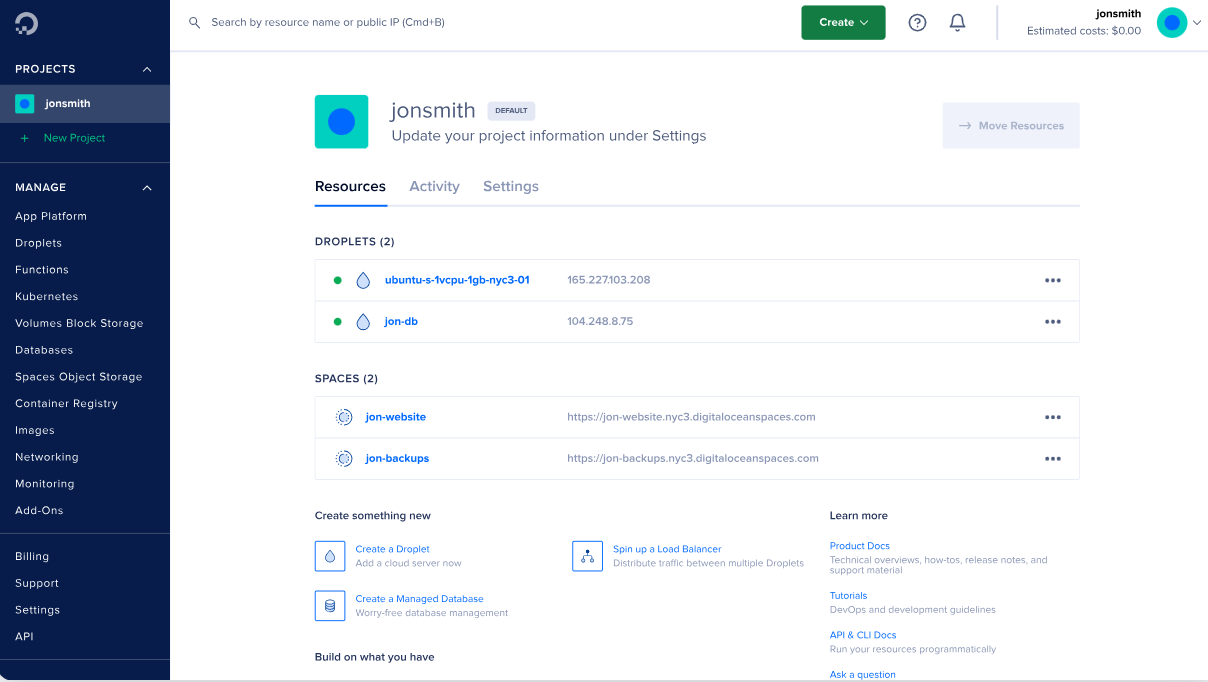
DigitalOcean, in contrast, relies on its Cloud Control Panel for managing infrastructure, which may be more suited to experienced users. The platform does offer 1-Click Apps to simplify launching services like WordPress, but the control panel can be daunting for those less familiar with managing cloud resources. DigitalOcean’s Droplets offer customization and flexibility, but the admin panel’s depth of features might be overwhelming for non-technical users compared to SiteGround’s more beginner-friendly approach.
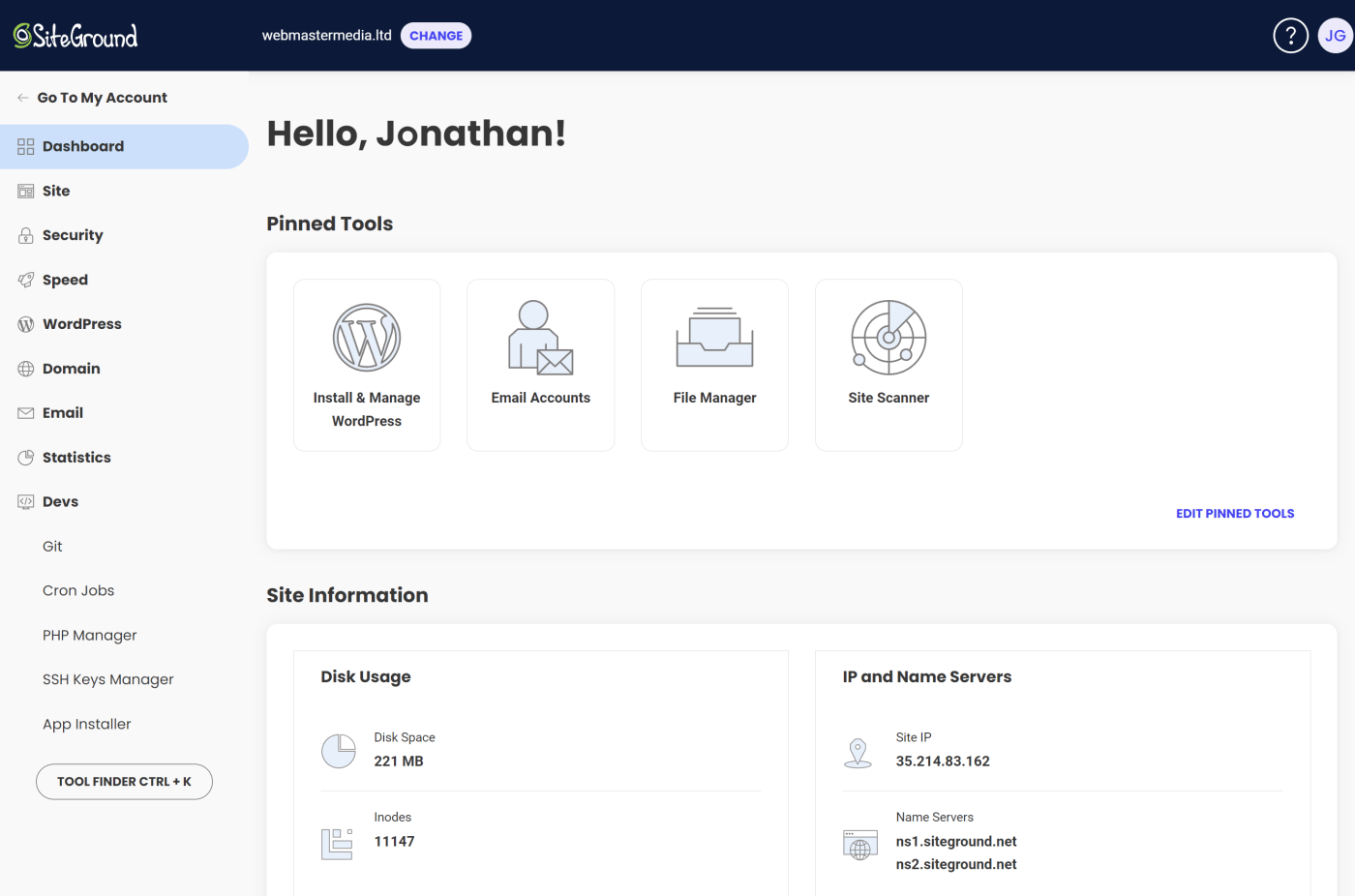
SiteGround provides a Free WordPress Migrator Plugin for hassle-free migrations, making it a top choice for WordPress users. Professional expert migrations can be availed for a fee, ensuring comprehensive service. DigitalOcean also offers migration tools such as snapshots and app deployment tools like Cloudways, but these often require more manual intervention and technical knowledge. Although Cloudways provides a managed solution, it comes with an additional cost and may not be as seamless as SiteGround’s free migration options.
SiteGround’s help center offers an extensive knowledgebase with articles, how-to guides, and troubleshooting instructions. Users have quick access to pinned help on every page, automated solutions for common issues, and 24/7 live help through chat, phone, and tickets. DigitalOcean’s documentation and tutorials are also extensive, with community support available for additional queries. However, direct customer support through their ticketing system and Cloudways’ additional support resources may not be as immediate as SiteGround’s multifaceted support options, including their highly rated customer care team.
User management
accessibility.
Score Components:
- Role customization (40%): Flexibility in creating and defining user roles and
permissions. - Ease of management (30%): User interface and tools for managing users.
- Access control (20%): Effectiveness of access control measures for different user
levels. - Scalability (10%): Ability to manage a growing number of users efficiently.
 8.4
8.4
 8.0
8.0
Winner SiteGround: Versatile user management features with customizable roles and white-label capabilities.
SiteGround and DigitalOcean offer distinct approaches to user management. SiteGround allows adding team members as collaborators with their own accounts and individual logins, facilitating site maintenance and support. It also supports white-label client access on specific plans, providing a customized experience without the SiteGround brand. Conversely, DigitalOcean provides roles such as Owner, Biller, and Member, with each having a fixed scope of access to shared resources, billing, and team settings. SiteGround provides more flexibility in creating and defining user roles, enabling users to tailor access controls specific to their needs.
In terms of user interfaces and tools for managing users, SiteGround’s Client Area offers intuitive options to add collaborators, create and manage roles, and assign white-label access. The steps to manage roles and user access are straightforward, with clear instructions available. DigitalOcean’s approach involves a centralized “Invite Members” button and a membership table that displays current roles and invitation statuses. Both interfaces are user-friendly, though SiteGround’s UI may offer more comprehensive controls through its custom role management system.
The access control measures on both platforms are well-executed. SiteGround’s detailed role creation and assignment process aligns with specific business requirements, making it ideal for teams and agencies with diverse client bases. White-label access further elevates SiteGround’s control measures, allowing seamless and brand-neutral client interactions. DigitalOcean’s predefined roles also provide clear boundaries and efficient team membership management, suitable for teams that require straightforward, consistent role applications. Both platforms effectively support scalability in managing an increasing number of users.
SiteGround User Roles Table
| Role | Description | Access Highlights |
|---|---|---|
| Collaborator | Team members who build or maintain the site. | Access to Site Tools and support through individual accounts. |
| Client (White-label) | Clients given access to site tools without SiteGround branding. | Customizable tool access; no visible SiteGround branding. |
| Custom Role | Created by users for specific tool access. | Tailored toolset defined by the user for specific needs. |
DigitalOcean User Roles Table
| Role | Description | Access Highlights |
|---|---|---|
| Owner | Full access to all team resources and settings. | Complete control over resources, billing, and settings. |
| Biller | Manages billing information only. | Access limited to billing details, no resource access. |
| Member | Full access to shared resources. | Restricted from billing information and team settings. |
Customer support
hosting provider.
Score Components:
- Support communication channels (30%): Measures the variety of customer support types
provided (live chat, chatbot, email, phone, etc.) - Availability (20%): Assesses the availability hours for each channel, including 24/7
support options. - Technical support quality (30%): Assesses whether the provider offers comprehensive
technical support, including hardware upgrades (e.g., HDD to SSD), software installations, and web
server configuration changes. - Enterprise support (20%): Checks if there are dedicated or priority support services
for enterprise-level customers.
 9.2
9.2
 7.8
7.8
🏆 Winner: SiteGround: Offers exceptional customer service with multiple support channels and highly trained staff.
 |
 |
|
|---|---|---|
Phone support |
||
Live chat support |
||
Chatbot |
||
Email/ticket support |
||
Enterprise support (dedicated agent, priority support) |
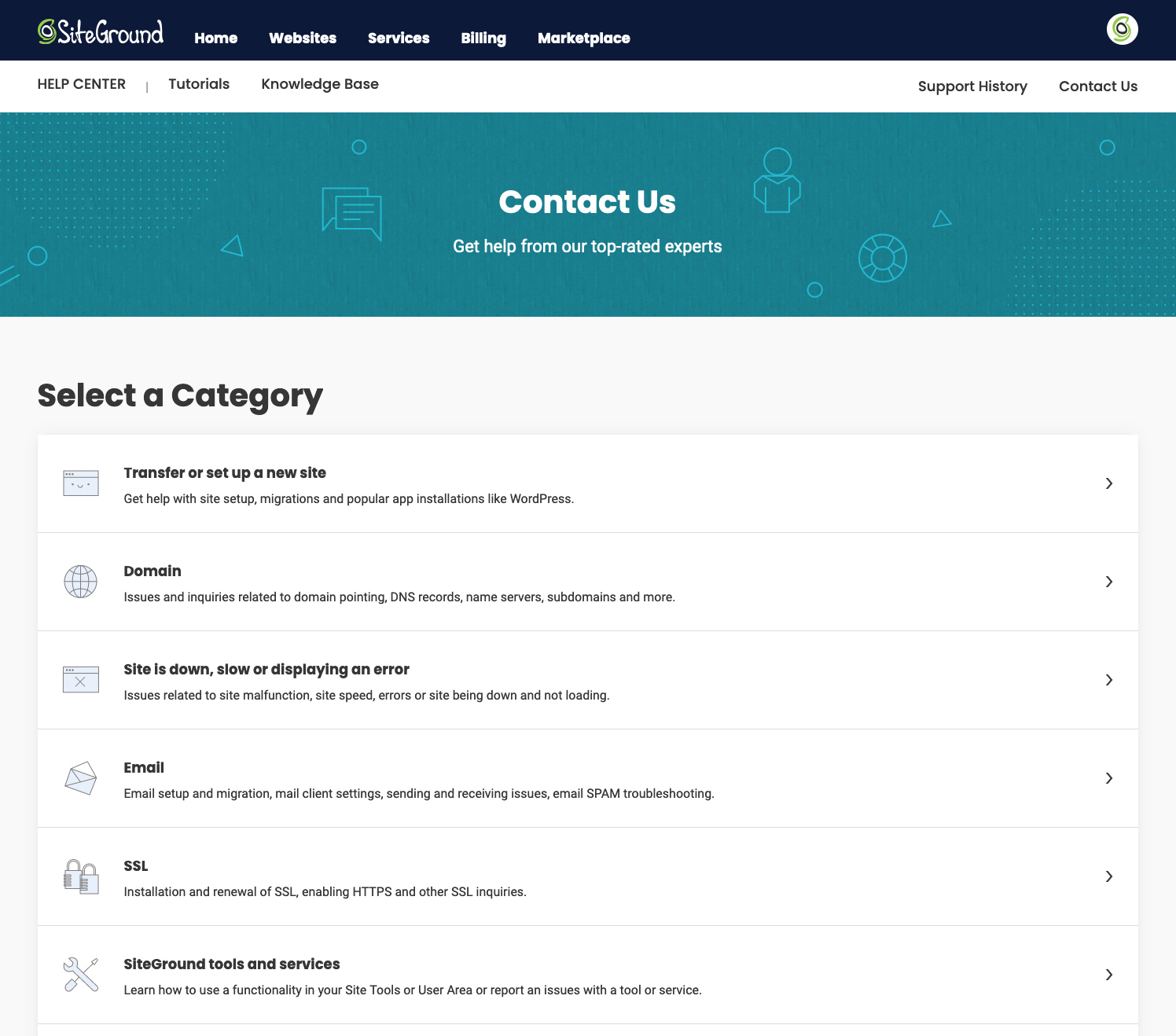
SiteGround stands out for its 24/7 availability across various support channels, including phone support, live chat, and a comprehensive ticket system. Customers commend the quick response times and the friendly and proficient support staff, who undergo thorough training to ensure high-quality service. SiteGround’s unique features like pinned help and automated solutions further simplify the user experience.
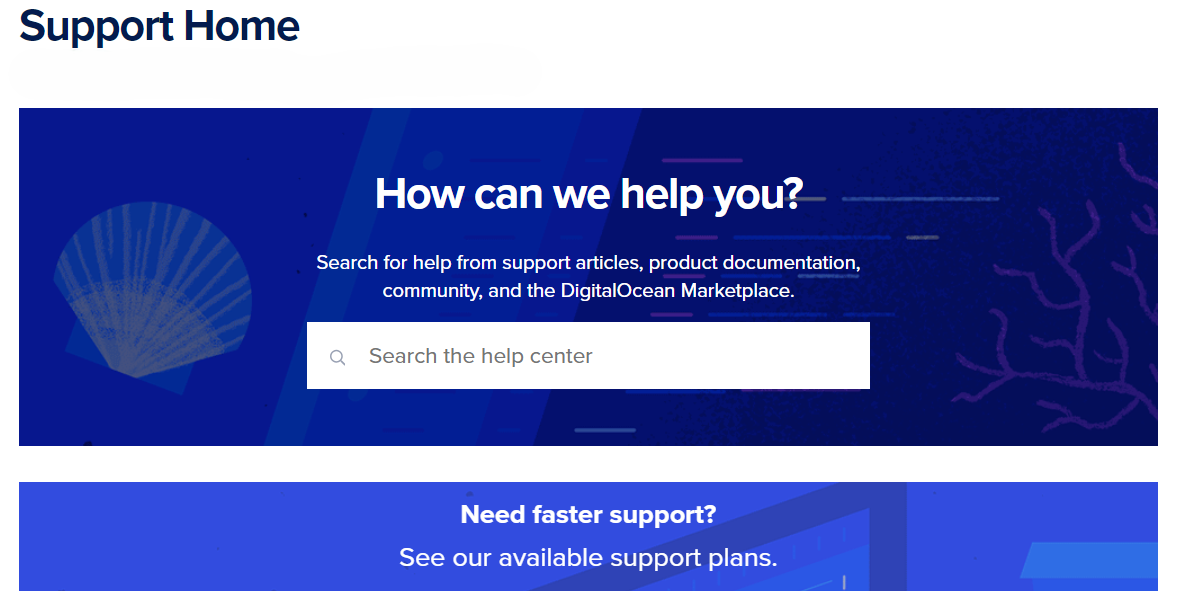
In contrast, DigitalOcean offers email and ticket support around the clock, with premium live chat available for an additional cost. Their community and extensive documentation provide additional resources to help users troubleshoot issues independently. Although DigitalOcean’s support options are more limited, the platform compensates with a user-friendly interface and effective community solutions.
Siteground vs Digital Ocean: User feedback
SiteGround garners consistently high praise for its exceptional customer support and user-friendly tools, frequently being described as reliable and straightforward to use. Users commend the fast and knowledgeable technical assistance, which is available through various channels like chat and phone, often highlighting the effectiveness and patience of support representatives. Despite these positive aspects, some users find renewal pricing relatively expensive and note that navigating to the support section can be cumbersome. Issues with specific features, such as webmail interface and certain plugins, are also mentioned, but overall, SiteGround is recommended for its strong support and ease of use, especially for beginners and small businesses.
DigitalOcean consistently garners praise for its simplicity, user-friendly interface, and transparent pricing, making it ideal for both beginners and experienced developers. Users appreciate the straightforward setup, reliable performance, and excellent customer support, highlighting features like one-click deployment and robust documentation. However, there are some minor criticisms, including a limited variety of server configurations compared to larger providers and occasional slow customer support response times. Despite these drawbacks, DigitalOcean is highly regarded for its cost-effectiveness, ease of use, and overall reliability, particularly for small to medium-sized businesses and startups.
Siteground vs Digital Ocean: FAQ
Which platform is better suited for hosting WordPress websites?
Both SiteGround and DigitalOcean offer managed WordPress hosting with tools to optimize performance and security. SiteGround includes WP-CLI, staging, and caching features in their managed WordPress hosting, making it highly user-friendly. DigitalOcean, while also supporting WordPress, focuses more on providing raw infrastructure and may require more technical expertise. Therefore, for a more seamless and specialized WordPress experience, SiteGround might be the better choice.
Are both platforms suitable for beginners?
SiteGround is particularly suitable for beginners due to its easy-to-use interface, built-in website builder, and comprehensive customer support, including live chat and phone support. DigitalOcean, on the other hand, is geared more toward developers and those with technical expertise, as it provides a more raw infrastructure experience. Therefore, SiteGround is generally considered more beginner-friendly.
Which platform offers better customer support?
SiteGround offers superior customer support with 24/7 availability via phone, live chat, and a ticket system, along with a highly responsive and knowledgeable support team. DigitalOcean provides email and ticket support, with premium live chat available at extra cost. While DigitalOcean’s community and documentation resources are extensive, SiteGround’s multiple support channels and trained staff give it the edge.
Which service is more suitable for hosting a high-traffic website?
DigitalOcean is more suitable for hosting high-traffic websites due to its high scalability, managed databases, and Kubernetes options that cater to large traffic needs. SiteGround also offers scalable solutions but primarily through plan upgrades, which might not be as flexible as DigitalOcean’s Droplet-based approach. Therefore, for high-traffic websites, DigitalOcean provides more robust and scalable options.
What are the differences in the control panels offered by each hosting service?
SiteGround offers a custom-built, user-friendly control panel that includes tools like the Automated Site Setup Wizard and WordPress Starter Plugin, making it easy for non-technical users. DigitalOcean uses its Cloud Control Panel, which is powerful but more suited for experienced users managing infrastructure. SiteGround’s interface is more intuitive and beginner-friendly, while DigitalOcean’s control panel offers deeper features for advanced users.
The making of this blog
We followed a clear, step-by-step process to write and research this article.









